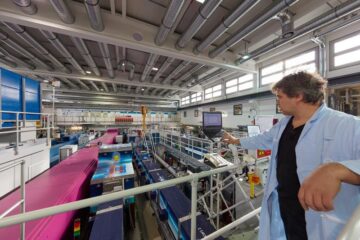Gold Nanoparticles Functionalized with Dendritic Polyglycerol Sulfates

<strong>Background</strong><br>
As selectins mediate the first contacts of leukocytes to the endothelium, the initial events of all kind of inflammatory responses, selectins are ideal targets for the therapeutic intervention of inflammatory diseases. <br><br> Dendritic polyglycerol sulfates (dPGS) alone and with aminoalcohols functionalized gold nanoparticles each have been shown to be good selectin inhibitors, as they prevent L- and P-selectins to bind their natural ligands with IC50 values in the nanomolar and picomolar range. <br><br> <strong>Technology</strong><br> We offer synthesized gold nanoparticles functionalized with highly branched polyglycerol sulfates, showing a high affinity for L- and P-selectins with IC50 values in the femtomolar range and therefore having a better anti-inflammatory potential compared to dPGS and aminoalcohol-functionalized nanoparticles alone. <br><br> Besides their use in the therapy of inflammatory diseases, dPGS-functionalized nanoparticles can also be used for diagnostic purposes. By using dPGS functionalized nanoparticles, selectin expressing inflammatory tissues can be localized and visualized. <br><br> <strong>Benefits</strong> <ul> <li>Improved selectin inhibition with IC50 = 180 fM </li> <li>Branched polyglycerols show high biocompatibility</li> <li>Visualization of gold nanoparticles by MRT possible </li> </ul> <p><strong>IP Rights</strong><br> DE patent application filed 05/2011<br> PCT application filed 05/2012 <br><br> <strong>Patent Owner</strong><br> Charité Universitätsmedizin Berlin<br> Freie Universität Berlin</p>
Weitere Informationen: PDF
ipal GmbH
Tel.: +49 (0)30/2125-4820
Ansprechpartner
Dr. Dirk Dantz
Media Contact
Alle Nachrichten aus der Kategorie: Technologieangebote
Neueste Beiträge

Bakterien für klimaneutrale Chemikalien der Zukunft
Forschende an der ETH Zürich haben Bakterien im Labor so herangezüchtet, dass sie Methanol effizient verwerten können. Jetzt lässt sich der Stoffwechsel dieser Bakterien anzapfen, um wertvolle Produkte herzustellen, die…

Batterien: Heute die Materialien von morgen modellieren
Welche Faktoren bestimmen, wie schnell sich eine Batterie laden lässt? Dieser und weiteren Fragen gehen Forschende am Karlsruher Institut für Technologie (KIT) mit computergestützten Simulationen nach. Mikrostrukturmodelle tragen dazu bei,…

Porosität von Sedimentgestein mit Neutronen untersucht
Forschung am FRM II zu geologischen Lagerstätten. Dauerhafte unterirdische Lagerung von CO2 Poren so klein wie Bakterien Porenmessung mit Neutronen auf den Nanometer genau Ob Sedimentgesteine fossile Kohlenwasserstoffe speichern können…

















